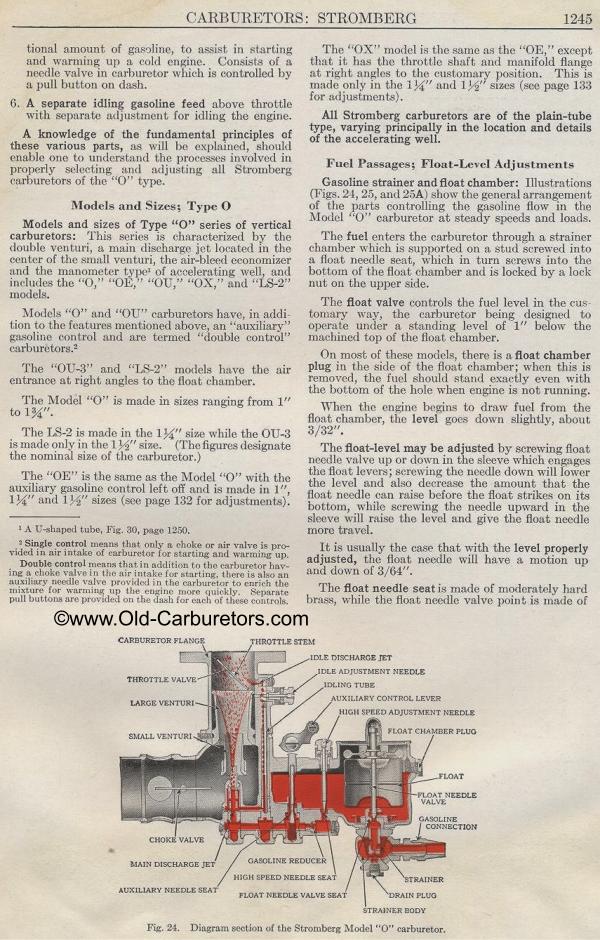STROMBERG
additional amount of gasoline, to assist in starting and warming
up a cold engine. Consists of a needle valve in carburetor which
is controlled by a pull button on dash.
6. A separate idling gasoline feed above throttle with separate
adjustment for idling the engine.
A knowledge of the fundamental principles of these various parts,
as will be explained, should enable one to understand the processes
involved in properly selecting and adjusting all Stromberg carburetors
of the "0" type.
Models and Sizes; Type 0
Models and sizes of Type "0" series of vertical
carburetors:
This series is characterized by the double venturi, a main discharge
jet located in the center of the small venturi, the air-bleed economizer
and the manometer type' of accelerating well, and includes the "O," "OE, "OU," "OX," and "LS-2" models.
Models "0" and "Of" carburetors have, in addition
to the features mentioned above, an "auxiliary" gasoline
control and are termed "double control" carburetors.'
The "OU-3" and "LS-2" models have the air entrance
at right angles to the float chamber.
The Model "0" is made in sizes ranging from 1" to
1%".
The LS-2 is made in the 1%" size while the OU-3 is made only
in the 1) " size. (The figures designate the nominal size
of the carburetor.)
The "OE" is the same as the Model "0" with
the auxiliary gasoline control left off and is made in 1",
1%" and 1;2" sizes (see page 132 for adjustments).
1 A U-shaped tube, Fig. 30, page 1250.
2 Single control means that only a choke or air valve is provided
in air intake of carburetor for starting and warming up.
Double control means that in addition to the carburetor having
a choke valve in the air intake for starting, there is also an
auxiliary needle valve provided in the carburetor to enrich the
mixture for warming up the engine more quickly. Separate pull buttons
are provided on the dash for each of these controls.
The "OX" model is the same as the "OE," except
that it has the throttle shaft and manifold flange at right angles
to the customary position. This is made only in the l q" and
1 " sizes (see page 133 for adjustments).
All Stromberg carburetors are of the plain-tube type, varying principally
in the location and details of the accelerating well.
Fuel Passages; Float-Level Adjustments
Gasoline strainer and float chamber: Illustrations (Figs. 21, 25,
and 25A) show the general arrangement of the parts controlling
the gasoline flow in the Model "0" carburetor at steady
speeds and loads.
The fuel enters the carburetor through a strainer chamber which
is supported on a stud screwed into a float needle seat, which
in turn screws into the bottom of the float chamber and is locked
by a lock nut on the upper side.
The float valve controls the fuel level in the cus tomary way,
the carburetor being designed to operate under a standing level
of 1" below the machined top of the float chamber.
On most of these models, there is a float chamber plug in the side
of the float chamber; when this is removed, the fuel should stand
exactly even with the bottom of the hole when engine is not running.
When the engine begins to draw fuel from the float chamber, the
level goes down slightly, about 3/32".
The float-level may be adjusted by screwing float needle valve
up or down in the sleeve which engages the float levers; screwing
the needle down will lower the level and also decrease the amount
that the float needle can raise before the float strikes on its
bottom, while screwing the needle upward in the sleeve will raise
the level and give the float needle more travel.
It is usually the case that with the level properly adjusted, the
float needle will have a motion up and down of 3/64".
The float needle seat is made of moderately hard brass, while the
float needle valve point is made of
Fig. 24. Diagram sec on of the Stromberg Model "0" carburetor.
IDLE DISCHARGE JET
IDLE ADJUSTMENT NEEDLE
IDLING TUBE
AUXILIARY CONTROL LEVER
HIGH SPEED ADJUSTMENT NEEDLE
CHOKE VALVE MAIN DISCHARGE JET AUXILIARY NEEDLE SEAT
STRAINER
FLOAT NEEDLE VALVE SEAT DRAIN PLUG STRAINER BODY
Previous page 1927
Supplement Home Next page 
|
